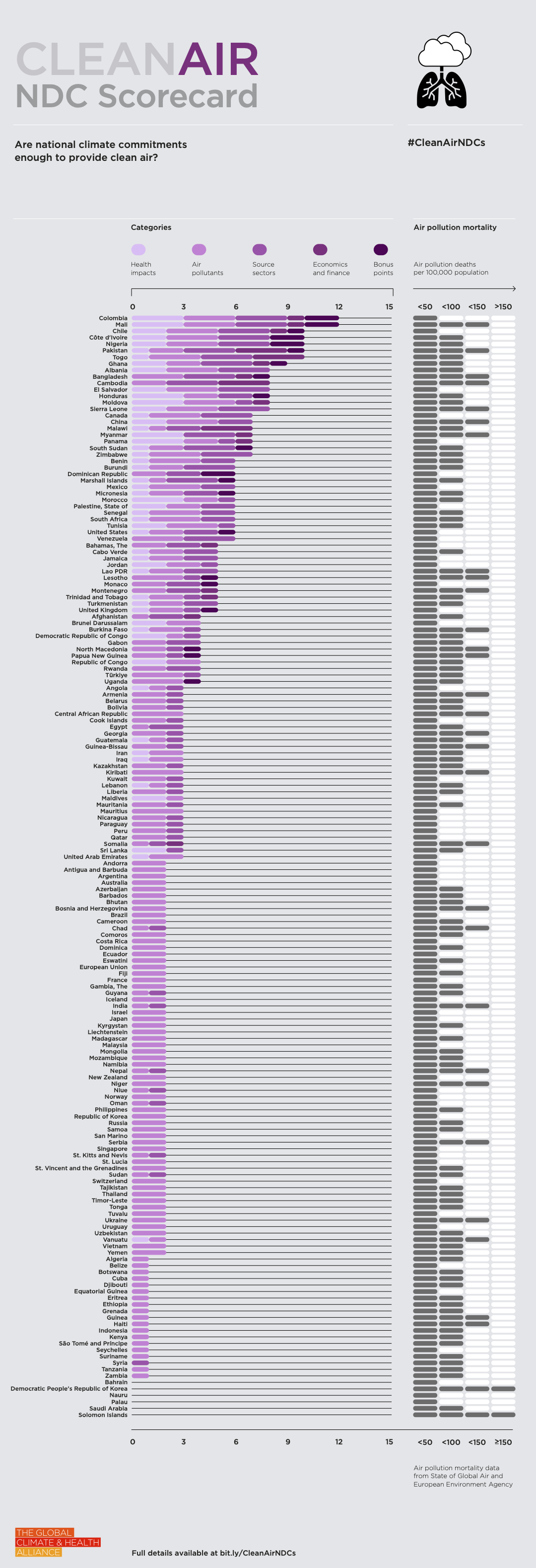A new scorecard has shown how the world’s biggest carbon-emitting economies are failing their citizens by not integrating air quality into national climate plans, while countries suffering the worst impacts of air pollution are taking the most action.
This is as 99% of the world’s population is said to be breathing polluted air – in excess of WHO guideline limits.
The Clean Air NDC Scorecard, which was published this week by the Global Climate and Health Alliance, showed how the world’s largest economies – the G20 countries – yet fall short when it comes to integrating clean air and climate action, while low- and middle-income countries – which suffer from the highest exposure to air pollution – demonstrate far more attention and ambition, with Colombia and Mali emerging as joint global leaders on the issue.
Also, the scorecard revealed how countries integrate air quality considerations into their national climate plans to deliver the Paris Agreement and examine whether countries recognise the health impacts of air pollution, or if they prioritise action to improve air quality.

The study showed that countries from the global south lead the way in terms of reflecting air quality in their national climate plans with all but one of the 15 countries scoring at least 8/15 being low or middle-income countries.
A breakdown of the scores showed that Colombia and Mali are on 12 points while Côte d’Ivoire, Nigeria, Pakistan and Togo are on 10 points. Ghana and Albania, Bangladesh, Cambodia, El Salvador, Honduras, Moldova, and Sierra Leone are on 9 points alongside Chile as the one high-income country in the top 15, with 10 points.
Read also: Drought turns Amazonian capital into climate dystopia
The scorecard also uncovered a glaring gap between the health burden of air pollution in many countries, and recognition and action on the issue in climate plans – a missed opportunity for people and economies. It found that out of the 170 commitments assessed in the scorecard, less than a third refer to the health impacts of air pollution.
Some of the biggest greenhouse gas emitters like India, Indonesia, Saudi Arabia and Australia had little or no mention of air pollution in their climate plans. Globally, seven million premature deaths occur every year due to air pollution. At the same time, recent work by The Guardian found that “almost everyone in Europe is breathing toxic air”, causing more than 400,000 deaths every year.
Among the G20 countries, Canada and China lead the way in integrating air quality in their national climate plans, according to the study. The lowest scorers are Australia, Brazil, the European Union, and India, and also COP28 hosts the United Arab Emirates. Indonesia and Saudi Arabia are lowest on the scorecard with one and zero points respectively.

“The Clean Air NDC Scorecard confirms the human cost of delaying the inevitable phase-out of fossil fuels”, said Jess Beagley, Policy Lead at the Global Climate and Health Alliance. “As major global polluters, it is crucial for G20 countries to embed air quality considerations into their NDC,”.
He said “yet no G20 government even scores half marks – indicative of lack of recognition of the links between climate and air quality, or ambition to take action”,. “It is also telling that the countries seeking to take the greatest action on air pollution often bear the brunt of the impacts”.
Story was adapted from GCHA.
